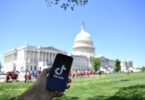HONG KONG (Reuters): China issued interim measures on Thursday to manage its booming generative artificial intelligence (AI) industry, saying they would apply only to services offered to the public as regulators seek to support development of the technology.
The rules, set to take effect on Aug. 15, come after Beijing signalled the end of its years-long crackdown on the tech industry, whose help it seeks to spur an economy recovering more slowly than expected after the scrapping of COVID-19 curbs.
Thursday’s rules clarified the scope of what regulators will target, following draft rules published in April that required firms to submit security assessments before launching their offerings to the public.
“The current version is very much in line with market expectations,” said Kai Wang, an analyst with Morningstar.
“It sends the positive signal that the regulators are paving the way for companies in China to launch their products on a large scale.”
China sees AI as an area in which it wants to rival the United States, and on which it has set it sights on becoming a world leader by 2030.
It is seen to be ahead of the regulatory curve as countries globally grapple with setting guardrails for the technology popularised by the success of OpenAI’s ChatGPT chatbot.
Such efforts must weigh up safety concerns and copyright protections against ensuring an environment beneficial to innovation.
Investment has poured into China’s generative AI scene and its firms have launched dozens of AI models, companies had held back from rolling out chatbots to the public until Beijing finalised rules for the technology and approved their products.
On Thursday, the regulator, the Cyberspace Administration of China (CAC) reiterated that content generated by generative AI had to be in line with China’s core socialist values.
Service providers had to ensure intellectual property rights were not infringed, it added, advising that legitimate data sources should be used.
However, the measures would not apply to those working on generative AI technology who did not plan to plan to offer services to the Chinese public, it said.
China wants to encourage the development of the technology, it said, citing areas such as generative AI algorithms and semiconductors, as well as engage in drawing up international rules.
“Relevant national authorities shall … improve their supervisory methods so that they are scientific and compatible with innovation and development,” the regulator said.
Chinese tech firms, such as Alibaba Group and Baidu Inc, developed their own ChatGPT-style chatbots.
On Thursday, JD.com became the latest to join the race, launching an enterprise-facing large language model it called ChatRhino.







